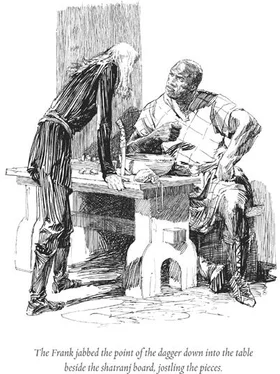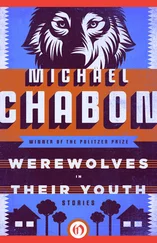Michael Chabon - Gentlemen of the Road
Здесь есть возможность читать онлайн «Michael Chabon - Gentlemen of the Road» весь текст электронной книги совершенно бесплатно (целиком полную версию без сокращений). В некоторых случаях можно слушать аудио, скачать через торрент в формате fb2 и присутствует краткое содержание. Жанр: Исторические приключения, на английском языке. Описание произведения, (предисловие) а так же отзывы посетителей доступны на портале библиотеки ЛибКат.
- Название:Gentlemen of the Road
- Автор:
- Жанр:
- Год:неизвестен
- ISBN:нет данных
- Рейтинг книги:3 / 5. Голосов: 1
-
Избранное:Добавить в избранное
- Отзывы:
-
Ваша оценка:
- 60
- 1
- 2
- 3
- 4
- 5
Gentlemen of the Road: краткое содержание, описание и аннотация
Предлагаем к чтению аннотацию, описание, краткое содержание или предисловие (зависит от того, что написал сам автор книги «Gentlemen of the Road»). Если вы не нашли необходимую информацию о книге — напишите в комментариях, мы постараемся отыскать её.
Gentlemen of the Road — читать онлайн бесплатно полную книгу (весь текст) целиком
Ниже представлен текст книги, разбитый по страницам. Система сохранения места последней прочитанной страницы, позволяет с удобством читать онлайн бесплатно книгу «Gentlemen of the Road», без необходимости каждый раз заново искать на чём Вы остановились. Поставьте закладку, и сможете в любой момент перейти на страницу, на которой закончили чтение.
Интервал:
Закладка:
His melancholy reflections were interrupted by the return of his aide-de-camp, his broad Bulgar face tight with suppressed information, from a quick trip up to the front of the column.
“A caravan,” the Bulgar said. “Radanite, by the look of them.”
A quarter of a league on, where the road finally abandoned the hills for the plain of Atil, a modest train of horses and wagons became entangled with the main body of the Crimean force, and the tarkhan dismounted and approached the lead Radanite wagon, a monstrous thing of heavy timber with tenoned wheels nearly as tall as the tarkhan drawn by two teams of massive, humped oxen, shaggy as wisents. It was driven by a young trader with a foolish way of smiling. On one side of him sat a rawhide-faced old mummy, thin and dark, with eyes as charitable as an eagle's. On the other side of the witless-looking driver a huge, fat Radanite with an unaccountably regal bearing beamed down, his pudding of a face so suffused with smugness or pleasure that the tarkhan immediately suspected the caravan of smuggling, or duty evasion, then dismissed the suspicion, knowing that none of their ilk would ever make such an arrant display of mercantile subterfuge. Next it struck him that this cheerful imperiousness might itself be a kind of subterfuge, and he ordered the contents of the wagon unloaded and checked against the bills of lading and the tax warrants from the customs house of Atil.
“Your excellency will naturally find that all of our documents are in order,” the old mummy said. “Though obtaining them at all was a considerable feat, given the turmoil that prevails in the Palace this morning.”
Thus the tar khan and his army learned of the death of the kagan. He ordered his troops to dismount and face the Palace, and there was a loud rush as of wind over thick grasses as they knelt in the road, their armor creaking, and prostrated themselves on the dense, half-frozen ground.
“Very sad,” said the great fat Radanite, giving his cheeks a rueful shake. “Tragic, really”
The tarkhan gave the order for a halt while he had a fire built and sat the merchants around it. He questioned them at length and in his mounting urgency and confusion failed, perhaps, to remark that his interlocutors were offering information, speculation and unfounded hearsay in a style that ill befitted and was hardly characteristic of Radanites. The snowflakes fell into the fire with an endless chorus of derisive hissing, and as the snow settled on the soldiers and the wagons and the rattling leaves of the boxwood trees, and as the Radanites concluded their testimony to the perfidy and outrages committed by the stooge and lackey Bul-jan, there presented itself to the tarkhan the odious question of what he ought to do next. Though he despised and misunderstood politics he was accustomed to wading through it as, when pressing an attack, through the slick of gore underfoot. Word of the massacre of the Arsiyah was already passing in half-whispers through his army, among whom there were many Muhammadan troopers. Treachery, regicide, rebellion; and a week's march behind him a Crimean city left ripe and unchastened. And meanwhile this great wisent of a Radanite blandly suggesting, with all due respect, and as if this were anything but the most unwelcome observation in the history of generalship, that the future of the kaganate might well lie in his capable hands.
“Who is that?” said the old mummy, rising slowly to his feet. The tarkhan turned and saw three riders coming up the road from the city. One was a young man, dressed in thick leggings, quilted Greek tunic and stained leather armor of the sort worn by the Rus, but with the face and the unmistakable green eyes of a Khazar. The others were a giant black man and a thin pale fellow, dressed in tattered oddments of armor and rag. The big one's eyes conducted what the general recognized as a professional assessment of their size, arms and mettle without betraying any hint of his conclusions, and the thin one bothered only to look politely scornful as if he found the whole idea of armies a bore. The young one rode right up to the tarkhan, whose hand went to his sword. The green eyes stirred a memory in the tarkhan, of the smell of linden flowers maddening the twilight on the eve of the Battle of Balanjar, in a meadow above a deep gorge from which there issued the distant boom of a river, and of the green-eyed bek who had inspired his commanders that night with a song of the hero Dede Korkut. He let go of the hilt of his sword.
“You know me,” said the young man.
“I know you,” the tarkhan said, not quite convinced.
“You held me on your knee, Chorpan,” the young man said. “You told me a story about my namesake, Alp Er, and the wolf You gave me a bow of horn, yes? Now I and my friends have slipped the chains that bound us to the rowing benches of the Rus, and come up from the river to find you.”
“To what end?”
“To assume command of this army,” said the young man, “and avenge all the crimes that Buljan has committed.”
The general heard something in this Alp's voice that he did not fully credit, and saw something in the face that he wanted to believe. He turned from the familiar gaze of the young man to a consideration of his soldiers, who had risen to their feet and stood watching the scene between their general and a beardless stripling with studied and sullen disinterest. Perhaps their desire to live another day outweighed their thirst for battle, but if you added to the latter their abhorrence of doing nothing at all, the balance tipped. For his part he wanted nothing more than to exercise his heart and right arm and leave all questions of credit and belief, of consideration and desire, to others who would do with them what they would, whether men died or generals or empires.
“I confess that I'm intrigued by your proposition, not to mention your audacity,” the tarkhan said. “But I feel constrained to point out that in fact it was a bow of ash wood, not horn.”
The young man blinked. The thin, pale rider coughed into his fist, and tried not quite successfully to conceal his amusement. The giant's horse bumped as if by chance against the horse of the green-eyed young man, jarring him out of his hesitation.
“My mistake,” said the stripling.
CHAPTER FIFTEEN
For half a day the captain of archers-a javshigar in the Army of the Khazar with fifteen years of service to the candelabrum flag-had suffered, shifting from foot to foot, pulling now at his mustache, now at the fingers of his glove, as the warrior king to whom he had sworn loyalty by oaths so ancient and binding they resisted even the power of the autumnal Disavowal haggled and pleaded for the safety of the house of Bul-jan with a barbarous swaggering Rus butcher whom the vicissitudes of the plunderous life had left only half a face.
Then as in ages to come it was a point of contention whether the Northmen were better endowed by their greedy and termagant gods for commerce or slaughter, but in the judgment of the captain of archers these were complementary gifts. Hour after hour the two men dickered, the bek with his wife at his side, his children squalling or staring in dumb wonder at the Rus. The Northmen sprawled along the wharf like white mountains in bloodstained tunics, encouraging Ragnar Half-Face to turn the greasy Khazar upside down by the ankles and shake him until every last dirham fell out of his pockets. Around them long trains of Buljan's slaves staggered down from the Qomr with armloads and sacks of gold and silver plate, gemstones and ivory silks and spices and perfumed wood, making up the price of passage for Buljan and his household. The Rus rowed the booty out to their ships and then rowed back again blowing and grinning and hungry for more. The captain of archers fidgeted and coughed and rolled his eyes at his men, as if such cupidity and dishonor were an inevitable but minor aspect of the human predicament akin to sharptonguedness in a wife, but felt a hot needle of outrage sounding his belly He prayed to his own God of Outrage, Iehovah, to send a righteous thunderbolt to strike the half-leering Rus chieftain down or, at the very least, to satisfy the bastard, and once and for all rid Khazaria of the stain of cowardice and the smell of the Northmen and of the ruinous usurper Buljan. But when the captain saw them bringing down the new elephant and felt the thrill of dismay running through all the stout Khazar archers of his company, he felt the insufficiency of prayer to the relief of grievous outrage. He settled his armored cap more firmly on his head, and cleared his throat, and with a hand on the hilt of his Damascene poniard strode heels knocking against the dock over to the side of the man who in a show of bankrupt bravery had proclaimed himself bek, and lowering his eyes, his voice clear but his manner as yet tinged with the long habit of obedience, said, “I regret, honored Buljan, that I must place you under arrest.”
Читать дальшеИнтервал:
Закладка:
Похожие книги на «Gentlemen of the Road»
Представляем Вашему вниманию похожие книги на «Gentlemen of the Road» списком для выбора. Мы отобрали схожую по названию и смыслу литературу в надежде предоставить читателям больше вариантов отыскать новые, интересные, ещё непрочитанные произведения.
Обсуждение, отзывы о книге «Gentlemen of the Road» и просто собственные мнения читателей. Оставьте ваши комментарии, напишите, что Вы думаете о произведении, его смысле или главных героях. Укажите что конкретно понравилось, а что нет, и почему Вы так считаете.












